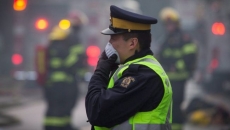Global Affairs Canada says 32 more Canadians were able to leave the Gaza Strip for Egypt on Thursday after a key border crossing reopened.
The department says there had originally been 40 Canadian names on the list of people approved to leave through the border crossing at Rafah, but precisely what changed wasn't immediately clear.
The key crossing had been reported closed earlier in the day as hundreds of people with links to Canada awaited news of when — and whether — they would be able to escape the besieged Palestinian territory.
On Tuesday, 75 Canadian citizens, permanent residents and their families were the first people with ties to Canada to leave the territory since the war between Israel and Hamas began a month ago.
But no Canadians were able to cross on Wednesday, with a U.S. State Department spokesperson saying the border had been closed because of a "security circumstance," offering little additional detail.
People coming from Gaza will be allowed to stay in Egypt for up to three days, and the Canadian government is providing them with accommodation and basic essentials during that time.
The first group of Canadian citizens, permanent residents and their family members have left #Gaza. Our team of officials has met them on the #Egyptian side of the #Rafah border, providing them with support and care. pic.twitter.com/eVpvCHoxxo
— Foreign Policy CAN (@CanadaFP) November 7, 2023
Thursday's news came as Prime Minister Justin Trudeau urged Israel to ensure that the newly agreed-upon humanitarian pauses in the fighting would last long enough for people to leave the area and for aid to arrive.
The White House said Thursday that Israel had agreed to put in place a daily four-hour humanitarian pause in what has been a relentless assault on Hamas in northern Gaza.
U.S. President Joe Biden said the move came after he called on Israel to cease bombardment for three or more days in the hopes that Hamas would release hostages, though he said there was "no possibility" of a ceasefire.
The Israelis committed to announcing each four-hour window at least three hours in advance, U.S. National Security Council spokesman John Kirby said, adding he expected the first humanitarian pause to be announced Thursday.
Israel was also opening a second corridor for civilians to flee the areas that are the current focus of its military campaign against Hamas, he said, with a coastal road joining the territory's main north-south highway.
Canada has been seeking such opportunities, which will hopefully lead to deeper long-term discussions about how Israelis and Palestinians can live beside each other in peace, Trudeau told a news conference Thursday.
"We've been calling for weeks now for humanitarian pauses," he said.
"They need to be significant; they need to last long enough to get people out (and) to get supplies in. And we have to start using them to start thinking about what the medium term and long term is."
Trudeau said that needs to include "a Jewish state of Israel" alongside "a viable Palestinian state … where they are both secure; where they are both able to protect their citizens and flourish."
He said Canada would help in the efforts to secure a two-state solution.
Early Thursday morning, some Canadian evacuees arrived at Toronto Pearson International Airport after fleeing through Rafah and boarding a 12-hour flight to Canada from Cairo.
A couple in their 50s embraced their son, who was waiting for them at the arrivals area. The family then quickly left the airport, headed for their home in London, Ont.
The Gaza Strip has been bombarded by thousands of Israeli airstrikes since Hamas militants stormed through the Gaza border on Oct. 7.
Israel's government says those surprise attacks killed 1,400 Israelis and another 240 people were taken hostage.
The Health Ministry in Gaza, which has been governed by Hamas since 2007, has put the Palestinian death toll above 10,500 people, and it reports that more than 4,000 of them were children. Canada has listed Hamas as a terrorist organization since 2002.
A worsening humanitarian crisis in the Gaza Strip, which has been largely cut off from the delivery of aid, has prompted prominent international aid organizations to call for a ceasefire and for food, water and medical supplies to be allowed to enter the region.
Federal officials have said there are more than 400 Canadians, permanent residents and their families in Gaza and that Canada has no direct control over the evacuation from the enclave.
Global Affairs Canada has also warned the situation is "fluid and unpredictable" and subject to rapid change.
"Canada does not determine when or how many persons can cross each day," it said in a statement late Wednesday afternoon.
"Canada continues to engage all relevant parties to ensure that Canadian citizens, permanent residents and their eligible family members presently in Gaza can exit safely and promptly."






